Disclosure: We may earn a commission from helpful, relevant links in our content. No cost to you. See our privacy policy.
Ever found yourself puzzled, watching your adult cat sneakily munching on your kitten’s food? You’re not alone – it’s a common feline conundrum many cat owners face. But why does this happen, and how to stop it?
But there’s a lot more to this than meets the eye. We’re about to delve into the reasons behind this behavior, its potential harm, and practical solutions to manage your feline family’s feeding time.
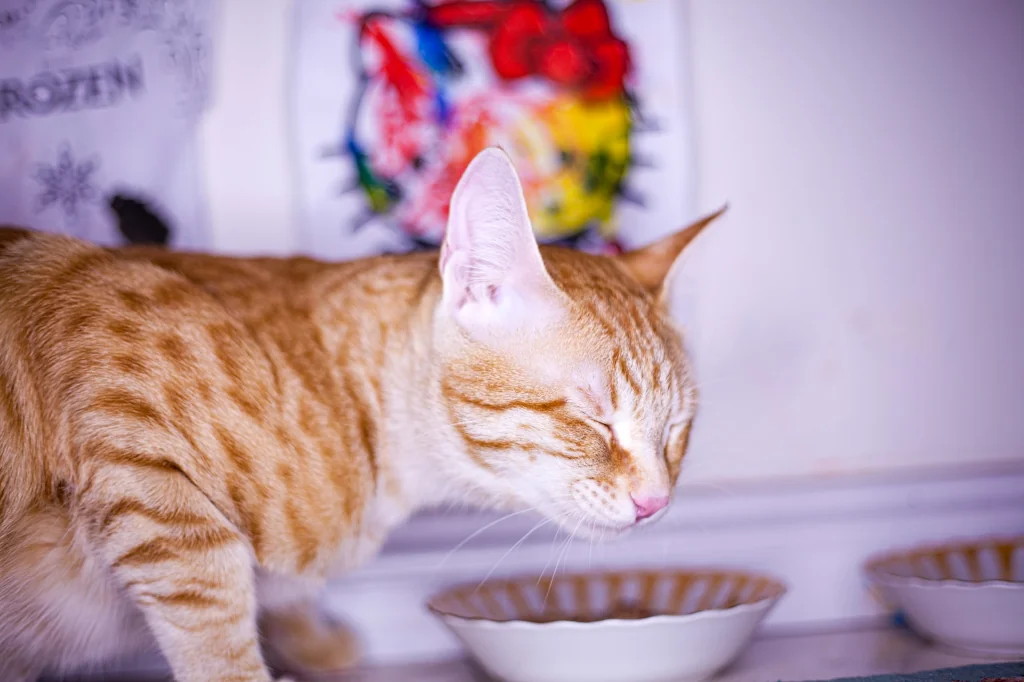
Why Is My Older Cat Tempted to Eat Kitten Food?
Kitten food is like the feline equivalent of a fast-food meal – it’s packed with all the tasty things.
Kittens require a diet high in protein, fat, and calories to support their rapid growth and development. This makes their food irresistibly tasty to your older cat. It’s like having a juicy burger in front of someone on a diet – the temptation is real!
However, it’s not just about the taste. Cats are creatures of curiosity. The introduction of a new type of food, especially one that smells different and richer, can pique their interest.
Your older cat might just be exploring this new addition to the household menu.
Understanding Food Stealing: A Behavioral Perspective
Cats, like many animals, have a natural instinct to secure resources, and food is a primary one.
This behavior is often more pronounced in multi-cat households where there’s a perceived competition for resources. Your older cat may see the kitten’s food as a ‘special treat’ and try to claim it before the ‘competitor’ (the kitten) does.
Moreover, cats are territorial creatures. Eating the kitten’s food could be your older cat’s way of asserting dominance or marking territory. It’s their way of saying, “I’m the boss here.”
Remember, understanding your cat’s behavior is the first step towards finding a solution. So, let’s explore what you can do to manage this situation in the next sections.
Is It Harmful if My Older Cat Eats My Kitten’s Food?
While kitten food won’t cause immediate harm to your adult cat, it’s not ideal for their long-term health.
Kitten food is specifically formulated to support the rapid growth and development of kittens, with higher protein, fat, and calorie content. Adult cats, on the other hand, require a balanced diet to maintain their weight and overall health.
Feeding your adult cat a steady diet of kitten food can lead to weight gain and obesity, given its high caloric content. Obesity in cats can lead to a host of health issues, including diabetes, heart disease, and arthritis.
Moreover, kitten food may not provide all the necessary nutrients an adult cat needs, potentially leading to nutritional deficiencies over time.
So, while an occasional nibble won’t harm your adult cat, it’s crucial to ensure they’re primarily eating food that’s appropriate for their age and health status.
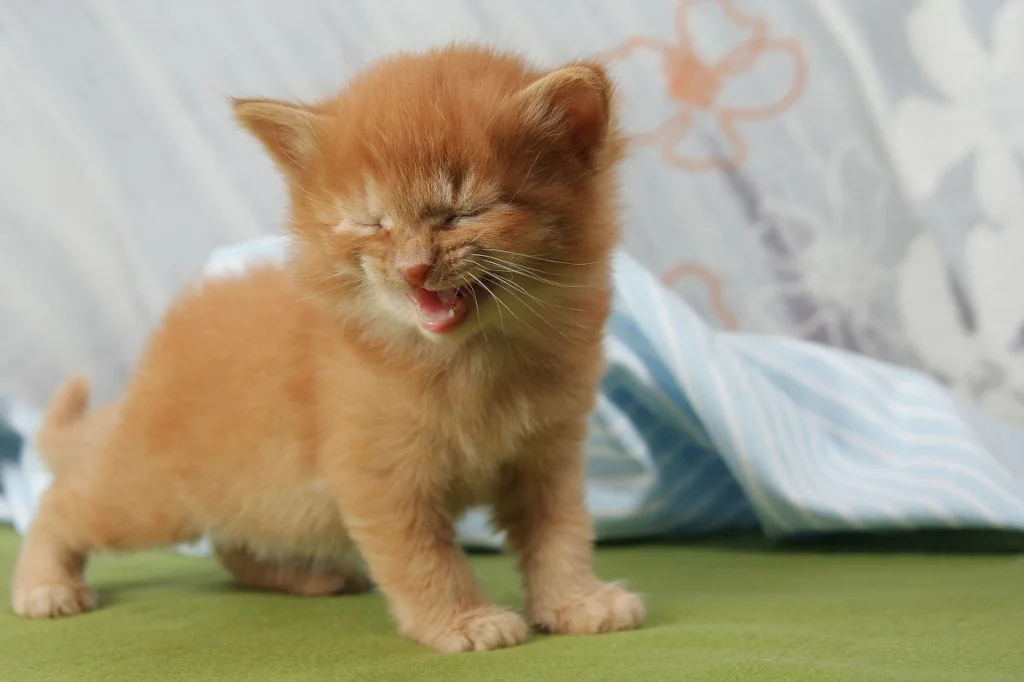
What Can I Do to Stop My Cat From Eating the Kitten’s Food?
Preventing your adult cat from eating your kitten’s food can be a bit of a challenge, but with a few practical strategies, you can manage this behavior effectively.
- Separate Feeding Areas. Create separate feeding zones for your adult cat and kitten. This can help reduce the perceived competition for food and allow your kitten to eat peacefully. Automatic feeders can be highly effective here – you literary ‘lock’ the food tank.
- Feeding Schedule. Implement a feeding schedule instead of free feeding. By providing meals at specific times, you can monitor and control who eats what. The same automatic feeders from above can help here as well, by setting a specfiic time when to feed your cats.
- Distraction. Distract your adult cat with their favorite toy or a bit of playtime when it’s the kitten’s feeding time.
- Slow Feeder Bowls. Consider using slow feeder bowls for your adult cat. These bowls are designed to slow down eating speed, which can give your kitten ample time to finish their meal.
- Behavioral Training. Positive reinforcement can go a long way. Reward your adult cat when they stick to their food, to foster good behavior that you want to see.
What to Do if Multiple Cats Have Different Dietary Needs?
In a multi-cat household, it’s like hosting a dinner party with guests having different dietary preferences. It can be a bit of a puzzle, but with a dash of creativity and a sprinkle of patience, you can ensure every feline guest is catered for. Here’s what you can do:
- Use Puzzle Feeders. These feeders require cats to solve a puzzle to get their food, slowing down fast eaters and providing mental stimulation.
- High Shelves for Feeding. Some cats, especially older ones, prefer not to jump too high. Placing the kitten’s food on a higher shelf can keep it out of reach from your adult cat.
- Use a Pet Gate. If you have the space, consider using a pet gate to separate feeding areas. This can be particularly useful if one of your cats has mobility issues.
- Try Different Food Textures. Some cats prefer wet food, others dry. If your adult cat likes dry food, they might be less tempted by the kitten’s wet food, or vice versa.
- Consult a Pet Nutritionist. If managing different dietary needs becomes overwhelming, consider consulting a pet nutritionist. They can provide a tailored feeding plan for your household.
Remember, patience is key here. It might take a few tries to figure out what works best for your feline family, but it’s all worth it for their health and happiness.
As we wrap up, remember that while it’s amusing to see your adult cat acting like a kitten, their nutritional needs are different. It’s essential to ensure that all your pets get the right food for their age and health status.
And remember, you’re not alone in this. Reach out to your vet or local pet community for support. After all, it takes a village to raise a cat… or in this case, a clowder!
FAQs
Will eating kitten food harm my adult cat?
Eating kitten food occasionally won’t harm an adult cat, but a steady diet can lead to obesity and nutritional deficiencies due to its high-calorie and high-fat content. With that in mind, it can help underweight healthy cats gain more weight.
What’s the difference between adult cat food and kitten food?
Adult cat food is formulated to maintain health and weight, with balanced nutrients. In contrast, kitten food is high in protein, fat, and calories to support rapid growth and development.
Are there cat-friendly ways to separate their feeding areas?
There are several cat-friendly ways to separate feeding areas. These include creating individual feeding stations, using timed automatic feeders, or feeding them in different rooms.
Alex, a passionate animal lover, has experience in training and understanding animal behavior. As a proud pet parent to two dogs and three cats, he founded AnimalReport.net to share insights from animal experts and expand his knowledge of the animal kingdom.

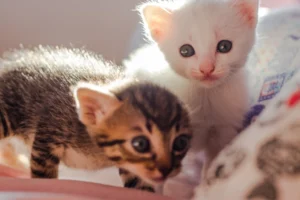
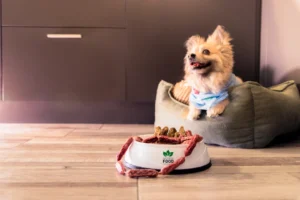
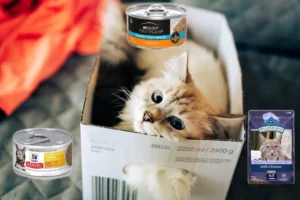
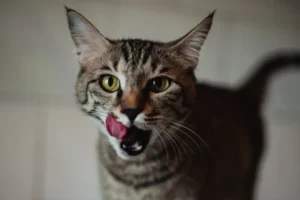
You’re so awesome! I don’t believe I have read a single thing like that before. So great to find someone with some original thoughts on this topic. Really.. thank you for starting this up. This website is something that is needed on the internet, someone with a little originality!